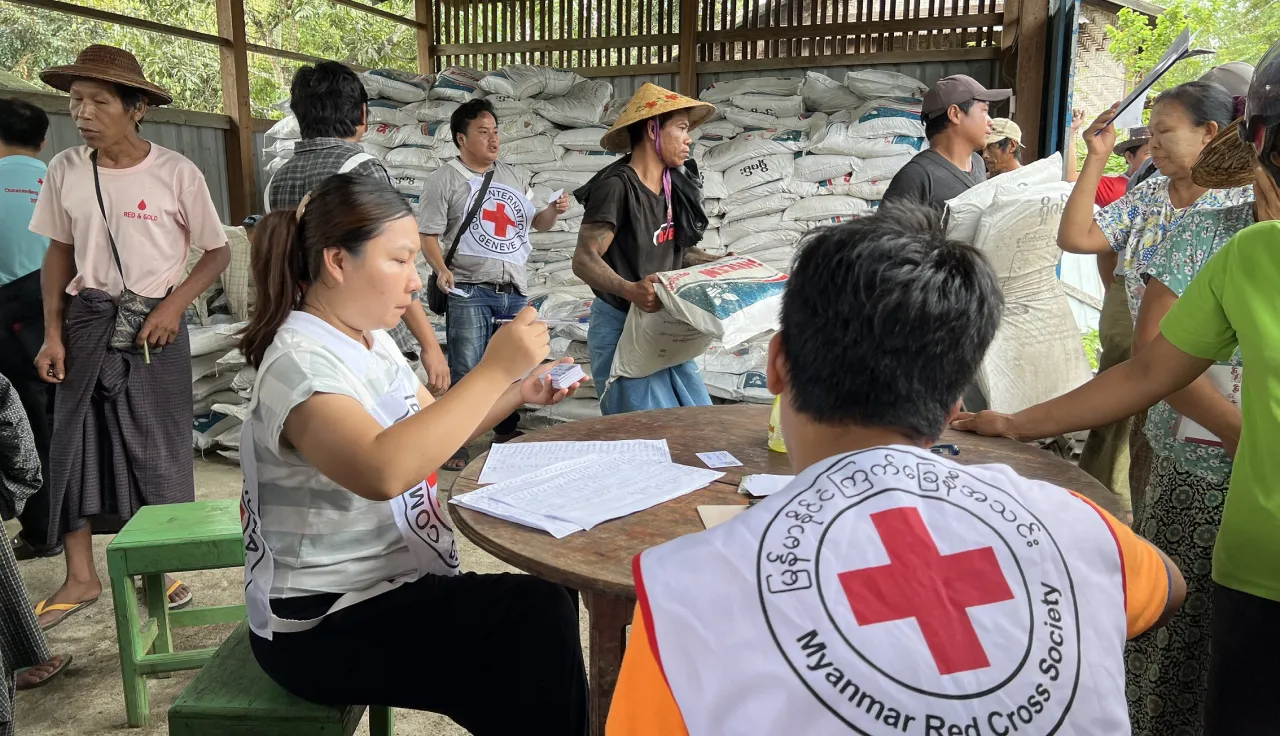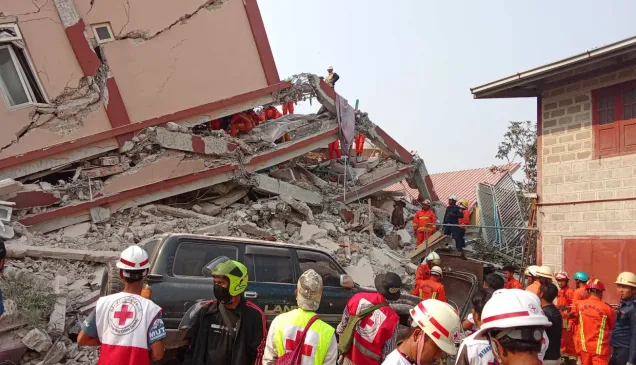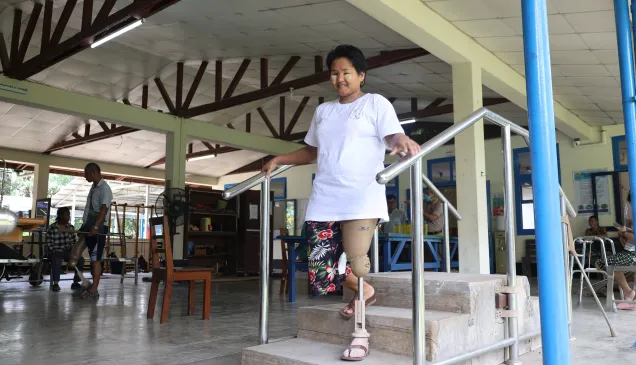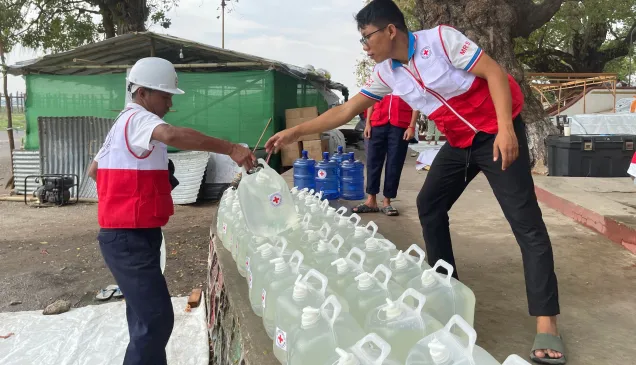Myanmar: One month on, earthquake survivors face continuing challenges
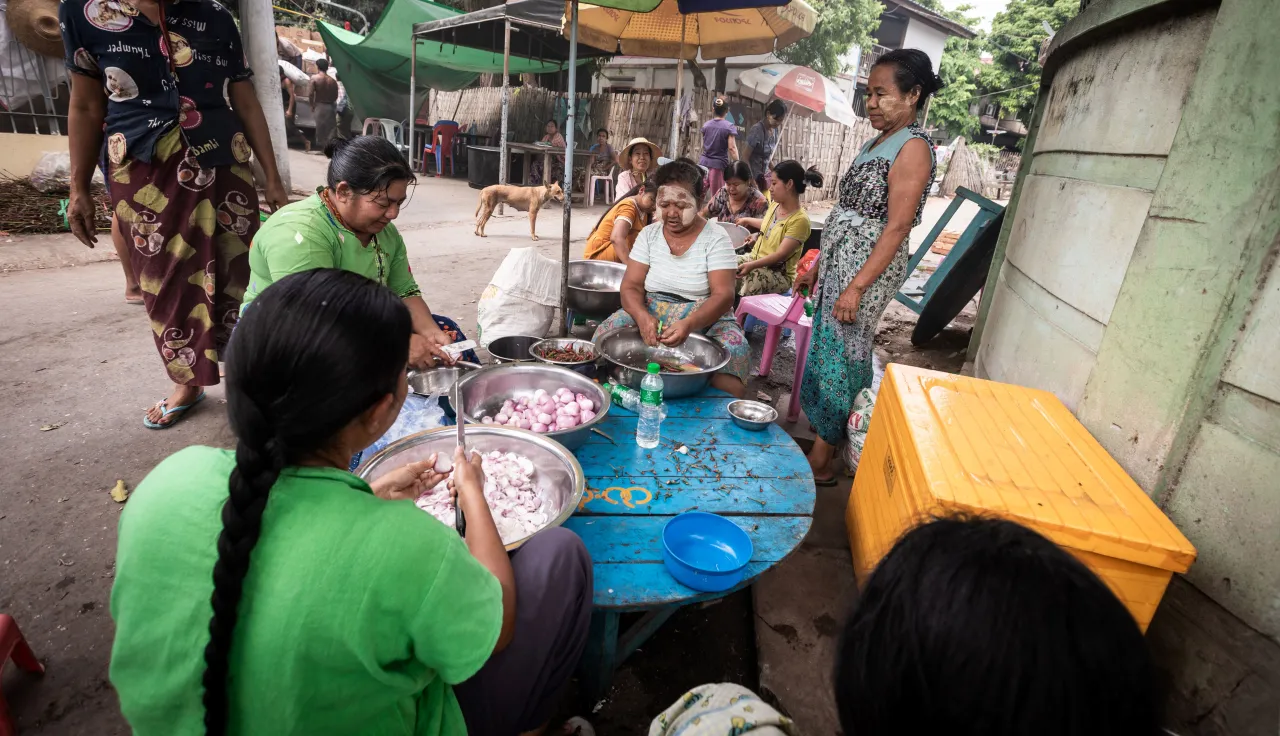
Photo: Stephen Ryan / ICRC
One month after a powerful earthquake devastated central Myanmar, the humanitarian situation remains dire for millions of people. Many communities are struggling to meet their basic needs amid scorching heat, unreliable access to safe drinking water, and other damaged infrastructure, while the risk of disease and further hardship continues to grow.
Since the earthquake struck, the ICRC, in partnership with the Myanmar Red Cross Society and local civil society organizations, has been working constantly to provide much needed support and assistance. Yet the scale of the needs demands an even broader response to ensure that the most vulnerable are not left behind.
A humanitarian emergency deepening under the heat
Across affected areas, thousands of families are still living in tents, makeshift shelters, or simply sleeping in the open. With daytime temperatures soaring to 40°C, the risks of dehydration are severe, and access to safe drinking water is limited. Damaged water infrastructure and minimal sanitation facilities heighten fears of waterborne disease outbreaks.
While the picture of needs in urban centres like Mandalay is becoming clearer, the situation in rural areas remains less understood and even more complex. These regions often overlap with conflict-affected areas, making humanitarian access challenging.
Health needs urgent and rising
Health remains one of the most pressing concerns in Myanmar following the earthquake. Many health facilities, already stretched, suffered heavy damage during the earthquake. In Mandalay and Sagaing, the ICRC has supported hospitals and clinics by providing medications and essential supplies to meet life-saving and daily medical needs.
Through the Myanmar Red Cross Society’s mobile clinics programme, supported financially and with medical supplies by the ICRC, essential healthcare is being delivered to displaced communities daily - a vital lifeline for those unable to reach traditional health services.
Restoring economic security and food access
With homes and businesses destroyed, many families have lost both shelter and their means of livelihood. In Mandalay and Sagaing, the ICRC is supporting local collective kitchens that provide daily meals to displaced people. Plans are also underway to deliver multipurpose cash grants to some 3,000 households, giving families greater autonomy in meeting their immediate needs.
In the medium term, livelihood recovery initiatives and support for farmers will be critical to improving food security across Myanmar — a country where even before the earthquake, 15 million people faced food insecurity.
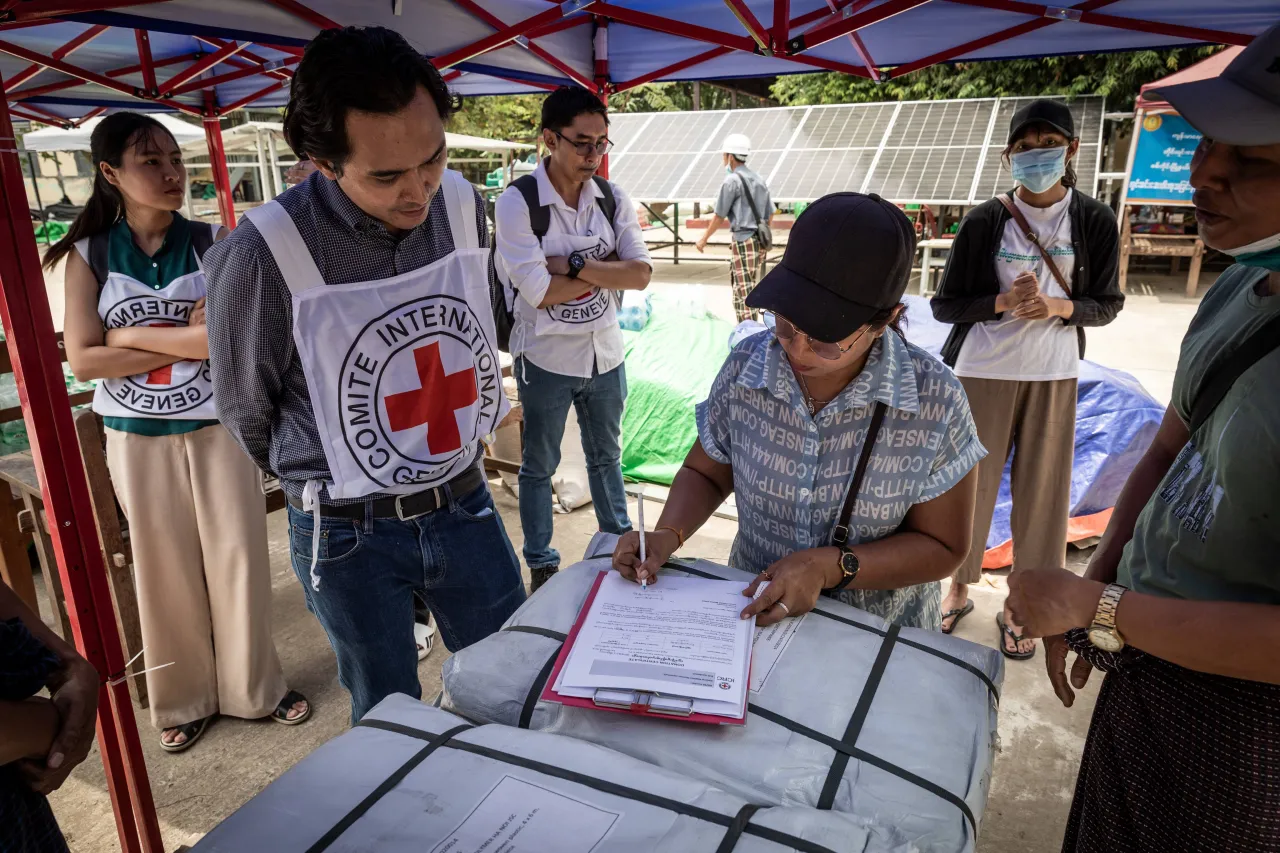
Photo: Stephen Ryan / ICRC
Photo: Stephen Ryan / ICRC
Safe water, safer shelters
Access to safe drinking water remains a life-saving priority. The ICRC rapidly distributed emergency water filters in the immediate aftermath. Thanks to previous training and equipment provided to the Myanmar Red Cross Society, emergency water treatment units were deployed, providing safe water in three severely affected locations. The ICRC provided shelter equipment to some communities in the days following the earthquake.
ICRC water and habitat engineers have also been assessing damaged hospital structures to support rehabilitation efforts — critical to restoring full healthcare services.
“During a recent visit to a community in Sagaing township,” said Ei Shwe Sin Myo, a Water and Habitat Engineer at the ICRC’s Mandalay sub-delegation, “people told me they urgently need clean water and lighting to protect themselves from snakes at night. Since the earthquake, at least 30 people have died from snakebites in Sagaing. The rubble makes it hard to spot these dangers, especially after dark.”
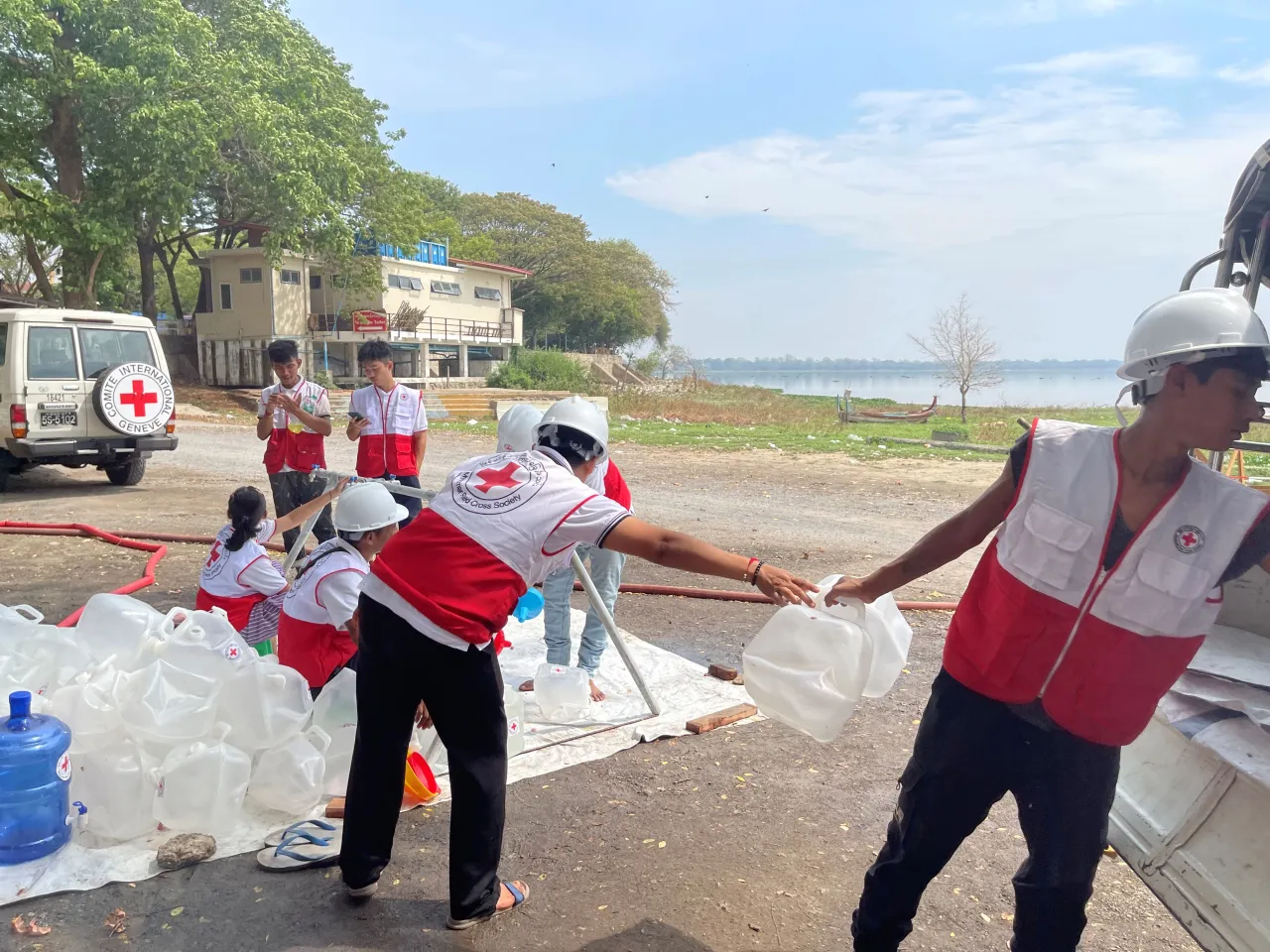
Photo: Aye Sandar Tun / ICRC
Photo: Aye Sandar Tun / ICRC
Protecting family links and dignity
Beyond the urgent physical needs, families continue to seek news of missing loved ones. Together with the Myanmar Red Cross Society, the ICRC is helping to reconnect families separated by the disaster. Our work also extends to supporting people in detention — ensuring that they, too, can share news of their wellbeing with their families.
Managing the dead respectfully was also a vital part of the emergency response, helping prevent further suffering and uncertainty for families in the future.
Navigating hidden dangers
In some rural areas, the earthquake’s devastation is compounded by the hidden threat of unexploded ordnance. The ICRC’s weapon contamination specialists are providing important sessions for communities on risk awareness and safer behaviour sessions for rescue workers, teachers, and local community volunteers from these areas, as well as directly delivered sessions by ICRC in urban centres. Building on the strengthen our Movement, ICRC has trained and helped Myanmar Red Cross Society to also deliver these potentially life-saving information sessions.
Responding with experience and presence
The ICRC’s ability to act quickly following the earthquake stems from our longstanding presence in Myanmar — 39 years of humanitarian work, nearly 600 staff, and established partnerships with the Myanmar Red Cross Society and civil society organizations. Prepositioned supplies in Mandalay and Yangon enabled immediate action, delivering clean water, emergency shelter, and life-saving medical supplies where they were needed most.
One month on, the needs continue to be enormous, and the humanitarian response must expand further. With the resilience of affected communities and the cooperation with our partners, we remain committed to bringing hope and assistance to those who have suffered so profoundly.
